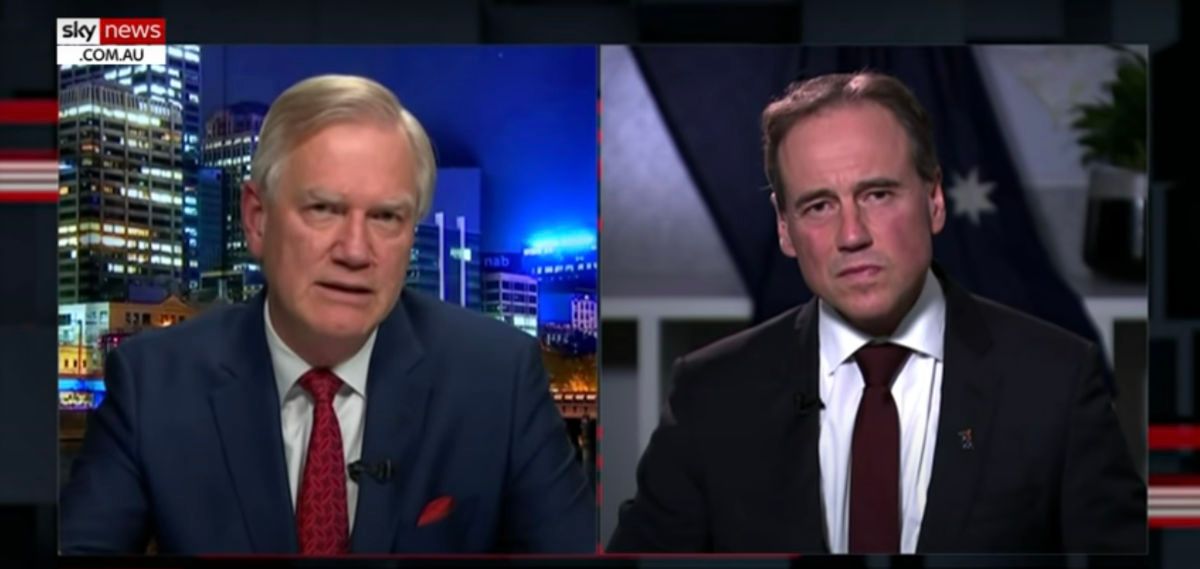The logic crisis in Australia's national conversation on coronavirus

The global pandemic highlights a major flaw in society: the ability of politicians, politicised experts and agenda-driven media voices to rely on (and get away with) logical fallacies, contradictions and inconsistencies when advancing arguments.
Imagine a society where public statements in national debates were scrutinised and skewered based on a high test of rational thought.
The dawn of a new era of enlightened reason.
Well, we're not there yet.
Let's illustrate the problem with just two sentences from a recent Sky interview the Health Minister Greg Hunt gave, where he justified the pet theory of Australia's national cabinet, that 'schools are safe':

Before analysing Hunt's statement it's worth clarifying what the overriding concern is from an epidemiological perspective:
Schools increase community transmission of Covid-19.
This concern is expressed in the decisions of comparable Western countries: the UK, USA, Canada and New Zealand have all shut or mostly shut schools based on expert advice.
That's it. It's not whether children individually are at risk, or whether teachers can be separated into at-risk and not-at-risk groups, or what impacts school closures have on society.
That's not to say they aren't important questions in other contexts - just that if we're considering a response to a pandemic, then the concern is and should be solely around viral spread.
With this in mind, let's pull apart Hunt's statement in detail
The advice of the medical expert panel, and this is based on evidence from around the world...
Evidence from around the world:
- is regularly dismissed as not relevant to Australia's particular situation when it doesn't suit the political narrative
- has guided our closest allies to shut their schools
But Hunt wants to leave the public with the impression national cabinet's position reflects a policy approach which is consistent with a global perspective - the opposite of reality.
...is that schools are safe for children.
Observe the deliberate narrowing of the concern.
This is one of the core political deceptions used in the debate.
As mentioned earlier, the concern is about the risk of schools increasing community transmission of Covid-19, but Hunt disingenuously reframes it as a question about individual safety of children.
If you watch carefully, you'll see the Prime Minister, Chief Medical Officer and numerous political apparatchiks and aligned media voices continually emphasise this point over and above the primary concern.
We referred to this as a core political deception, and it's one with a long history, going all the way back to Aristotle, who codified it as a logical fallacy in Organon.
Now commonly referred to as an irrelevant conclusion (ignoratio elenchi), Arthur Ernest Davies describes it in his book "Fallacies":
The nature of the fallacy, then, consists in substituting for a certain issue another which is more or less closely related to it, and arguing the substituted issue.
When the question is "Aren't schools a risk for community transmission?" and you continually get the answer "Schools are safe for children" you know you're dealing with an irrelevant conclusion.
Q: "Aren't schools a risk with community transmission of coronavirus?"
— Crush The Curve Today (@crushthecurve_) April 16, 2020
A: "Schools are safe for children."
This is an example of what Aristotle called an 'irrelevant conclusion' some 2400 years ago.
There's very, very little evidence of transfer from student to student amongst school children
In a pandemic involving a highly infectious disease - where hard evidence is still scant and asymptomatic transmission is a major concern - the rational default is to assume children are infectious until evidence proves they are not.

The burden of proof is squarely on Professor Murphy and Prime Minister Scott Morrison to present this evidence.
But rather than provide evidence for their own position they attempt to shift the burden of proof by demanding evidence for the contrary position (a logical fallacy called argument from ignorance).
Absence of evidence (that children are infectious) is used to assume evidence of absence (that children are not infectious).
This tortuous logic is made all the more absurd when you consider an important point: if even one student is identified as infected by coronavirus, the entire school is shut and cleaned and in parallel contact tracing and isolation processes are followed.
Theory: Children are not infectious.
— Crush The Curve Today (@crushthecurve_) April 24, 2020
Practice: Children are infectious. A child who tests positive removed from school, isolated, school closed and deep clean undertaken.
The theory is only relied on for the economic agenda of prematurely opening schools and nothing more. pic.twitter.com/CbKSUFWHze
So much for faith in the peculiarly Australian belief that schools are safe and kids are low-risk.
But we should have faith in something: the idea that if we collectively
- sharpen and deploy logic and reason
- skewer fallacious arguments
- demand rationally consistent positions from our political leaders
...that we may just help shift our national conversation into a healthier, safer and more beneficial state than it currently is.
